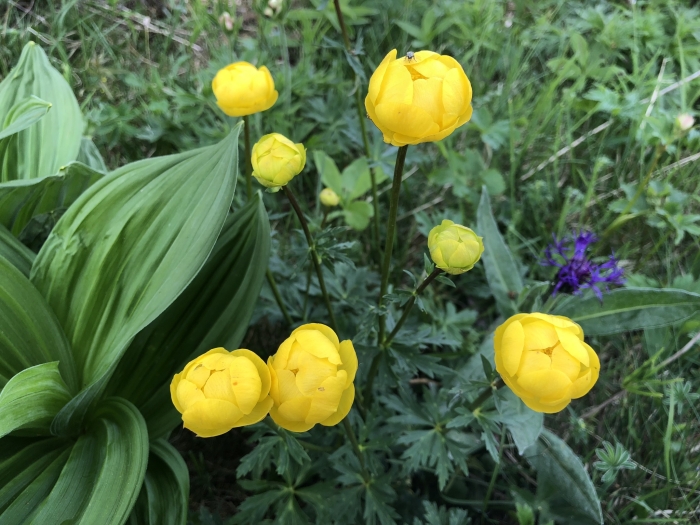Globe Flower
(Trollius europaeus)
Globe Flower (Trollius europaeus)
/
/

Jason Grant
CC BY 4.0
Image By:
Jason Grant
Recorded By:
Copyright:
CC BY 4.0
Copyright Notice:
Photo by: Jason Grant | License Type: CC BY 4.0 | License URL: http://creativecommons.org/licenses/by/4.0/ | Rights Holder: Jason Grant | Publisher: iNaturalist | Date Created: 2018-05-27T13:24:47-07:00 |


















































Estimated Native Range
Summary
Trollius europaeus, commonly known as Globe Flower, is a deciduous perennial herb native to cool temperate regions, including damp meadows, woodland clearings, and along stream banks in Europe and Asia. It typically grows up to 60 cm high and is known for its bright yellow, globe-shaped flowers that can reach up to 3 cm across. The showy petaloid sepals conceal the true petals, which are small and have nectaries at their base. The plant is characterized by a profusion of stamens and produces a large number of wrinkled follicles. Its leaves are deeply divided into 3–5 toothed lobes, adding to its ornamental value. The Globe Flower blooms from June to August, offering a long season of visual interest.
Gardeners appreciate Trollius europaeus for its vibrant flowers and its ability to thrive in moist, shady conditions, making it an excellent choice for woodland gardens, waterside plantings, and as a border plant in cooler climates. It requires consistently moist soil and does best in part shade to full shade. While it is not drought-tolerant, it is relatively low maintenance once established in the right conditions. However, it can be susceptible to powdery mildew and should not be planted in overly dry areas. Due to its potential invasiveness when grown outside its native range, it is important to consult local guidelines before planting to prevent ecological disruption.CC BY-SA 4.0
Gardeners appreciate Trollius europaeus for its vibrant flowers and its ability to thrive in moist, shady conditions, making it an excellent choice for woodland gardens, waterside plantings, and as a border plant in cooler climates. It requires consistently moist soil and does best in part shade to full shade. While it is not drought-tolerant, it is relatively low maintenance once established in the right conditions. However, it can be susceptible to powdery mildew and should not be planted in overly dry areas. Due to its potential invasiveness when grown outside its native range, it is important to consult local guidelines before planting to prevent ecological disruption.CC BY-SA 4.0
Plant Description
- Plant Type: Herb
- Height: 1.5-2 feet
- Width: 1-1.5 feet
- Growth Rate: Moderate
- Flower Color: Yellow
- Flowering Season: Spring, Summer
- Leaf Retention: Deciduous
Growth Requirements
- Sun: Part Shade
- Water: Medium
- Drainage: Slow, Medium
Common Uses
Butterfly Garden, Deer Resistant, Rabbit Resistant, Showy Flowers, Water Garden
Natural Habitat
Cool temperate regions, including damp meadows, woodland clearings, and along stream banks
Other Names
Common Names: Globeflower, European Globeflower, Europäische Trollblume, Boule-D’Or, Trolle D’Europe, Smörbollar, Bullerblomster, Daldockor, Smörboll, Trollblume
Scientific Names: , Trollius europaeus, Trollius europaeus subsp. europaeus, Trollius aconitifolius, Trollius europaeus var. humilis, Trollius humilis, Trollius napellifolius, Trollius giganteus, Trollius connivens, Trollius emarginatus
GBIF Accepted Name: Trollius europaeus L.